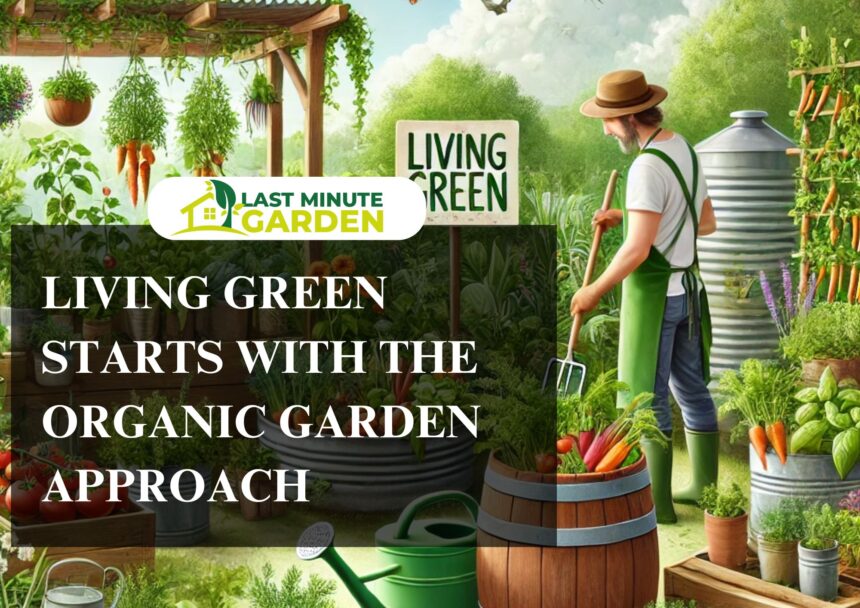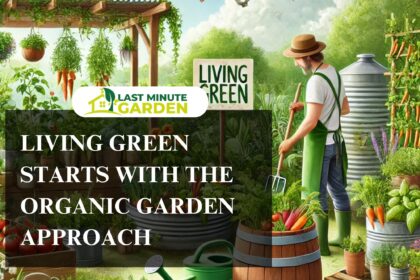Sustainability has become more than just a trend—it’s a necessity. One of the most effective ways to embrace a sustainable lifestyle is by adopting an organic garden approach.
Organic gardening goes beyond growing food without synthetic chemicals; it promotes environmental health, improves personal well-being, and ensures long-term ecological balance.
What exactly makes organic gardening so beneficial? Let’s explore the key advantages of using an organic garden approach for sustainable living.
Why Choose an Organic Garden Approach?
An organic garden is not just about avoiding chemical fertilizers and pesticides; it’s about working in harmony with nature.
The organic garden approach focuses on soil health, biodiversity, and ecological responsibility, making it an ideal method for anyone looking to contribute to a greener planet.
Below are some compelling reasons why an organic garden is a valuable addition to a sustainable lifestyle.
1. Environmental Benefits
Organic gardening plays a crucial role in protecting the environment. By eliminating synthetic pesticides and fertilizers, you reduce harmful runoff that contaminates water sources and disrupts ecosystems.
Additionally, the organic garden approach promotes soil health by enhancing its natural composition with compost, manure, and organic matter. Healthy soil leads to improved water retention, reducing the need for excessive irrigation.
Furthermore, organic gardens contribute to cleaner air by avoiding the use of chemical sprays that release harmful toxins. The use of natural composting methods also reduces landfill waste, as organic matter is repurposed to enrich the soil rather than being discarded.
2. Healthier Food, Healthier You
One of the primary reasons people switch to organic gardening is the promise of chemical-free, nutrient-rich produce.
Conventionally grown food often contains pesticide residues that may pose health risks over time.
By using an organic garden approach, you have complete control over what goes into your food, ensuring that you and your family consume fresh, safe, and highly nutritious fruits, vegetables, and herbs.
Additionally, organic produce has been found to contain higher levels of antioxidants, which help combat diseases and improve overall health.
Consuming homegrown food also eliminates the risk of preservatives and artificial additives that are commonly found in store-bought fruits and vegetables.
3. Supports Biodiversity
Unlike conventional farming, which often relies on monoculture practices, the organic garden approach encourages biodiversity.
Growing a variety of plants attracts beneficial insects, pollinators, and birds that help maintain a balanced ecosystem.
Companion planting—a technique commonly used in organic gardens—enhances plant health, deters pests naturally, and contributes to overall garden productivity.
Biodiversity in organic gardens also helps build resilience against pests and diseases. When different plant species coexist, they create a natural balance that reduces the risk of widespread infestations, leading to a healthier and more self-sustaining environment.
4. Cost-effective and Resourceful
Many people assume that it is expensive to go by the organic garden approach, but in reality, it can save you money in the long run.
By producing your own food, you cut down on grocery bills while reducing reliance on commercially grown produce.
Additionally, organic gardening encourages the reuse of natural resources, such as composting kitchen scraps to create nutrient-rich fertilizer, thereby minimizing waste.
Aside from reducing costs, organic gardening also fosters self-sufficiency. Instead of depending on store-bought vegetables that may have traveled long distances, you can enjoy fresh, homegrown food directly from your garden.
This not only supports sustainable living but also enhances food security within your household.
5. Improves Soil Health
The foundation of any successful garden is healthy soil. Organic gardening practices, such as composting and crop rotation, help maintain and improve soil structure.
Unlike chemical fertilizers that can degrade soil over time, organic matter enriches it with essential nutrients, leading to long-term fertility and productivity.
Healthy soil teeming with beneficial microorganisms enhances plant growth and reduces the likelihood of soil-borne diseases.
Over time, organically managed soil becomes more resilient, supporting plant life without the need for artificial interventions.
6. Reduces Carbon Footprint
Growing your own food organically helps reduce the carbon footprint associated with industrial agriculture. Mass food production involves transportation, packaging, and excessive energy use, all of which contribute to greenhouse gas emissions.
By cultivating an organic garden, you cut down on food miles and contribute to a more sustainable food system.
Additionally, organic gardening techniques, such as no-till farming and composting, help sequester carbon in the soil, reducing overall carbon emissions.
This means that by maintaining an organic garden, you’re actively playing a role in mitigating climate change.
7. Enhances Mental and Physical Well-Being
Gardening is not only beneficial for the planet but also for personal health. Spending time outdoors, tending to plants, and engaging in physical activity can reduce stress, improve mood, and boost overall well-being.
Studies have shown that gardening can lower cortisol levels, enhance cognitive function, and provide a sense of accomplishment.
Furthermore, organic gardening offers an opportunity for mindfulness and relaxation. The process of planting, nurturing, and harvesting fosters a deeper connection with nature, promoting emotional and mental resilience.
It’s a therapeutic activity that not only nourishes the body but also enriches the mind and soul.
8. Strengthens Community Connections
Organic gardening can be a community-driven initiative that brings people together. Whether through local gardening clubs, farmers’ markets, or shared urban gardens, practicing the organic garden approach creates opportunities for collaboration, knowledge-sharing, and sustainable development.
Community gardens provide access to fresh produce for those who may not have space for a personal garden while fostering a sense of collective responsibility for environmental conservation.
When more people embrace organic gardening, it leads to widespread positive change within neighborhoods and beyond.
Conclusion
By embracing the organic garden approach, you not only secure better food for yourself but also create a positive impact on the environment and society.
Using an organic garden approach for sustainable living offers countless benefits, from environmental conservation and cost savings to improved health and well-being.
By choosing organic methods, you contribute to a healthier planet while enjoying fresh, nutritious produce. Whether you have a small backyard or a community plot, adopting organic gardening principles is a step toward a more sustainable and fulfilling lifestyle.
Start your organic garden today and experience the transformative power of growing food the natural way.





